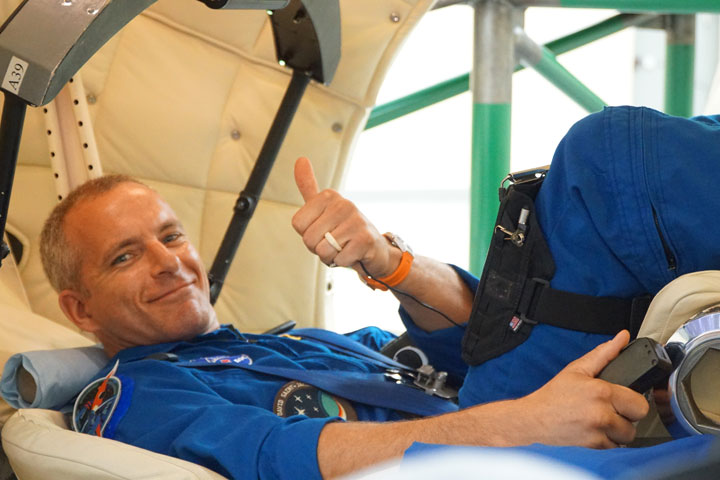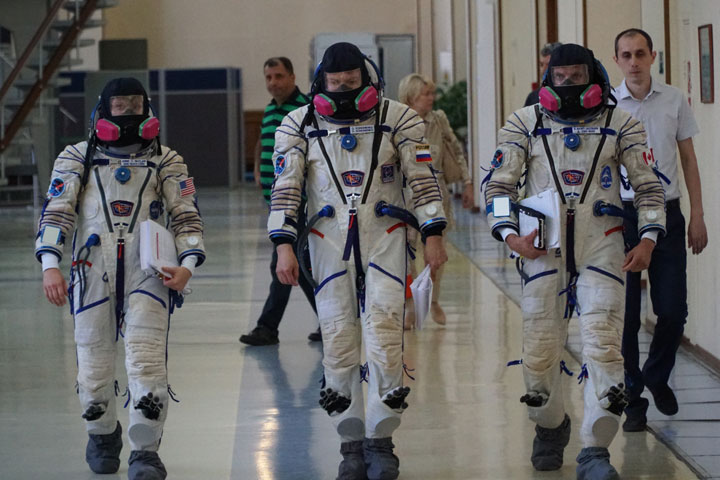
On the sixth episode of Russia Rising, we’ll boldly go where no podcast has gone before.
The International Space Station has long been heralded as a beacon of geopolitical co-operation, where representatives from 18 countries have lived and worked together, trusting each other with their lives. And all of them, including Canada and the United States, rely on Russia to hitch a ride to the stars.
But that close, interconnected relationship is now being tested as space becomes increasingly militarized and privatized. The White House is calling for the establishment of a “Space Force” within the U.S. military to counter what it says are growing threats from China and Russia. And billionaires Richard Branson, Elon Musk and Jeff Bezos have launched private companies to ferry supplies and even paying customers to the cosmos.
But should we believe the hype? Are we really on the cusp of a new space race? To find out what the future of space travel really looks like, we’ll ask the spacemen and spacewomen who’ve been there and back.
We’ll take a rare tour of Star City, the once-top-secret cosmonaut training facility on the outskirts of Moscow. That’s where we find Canada’s newest spaceman, David Saint-Jacques, preparing to spend six months aboard the International Space Station.
Saint-Jacques distinctly remembers being six years old and seeing his first photograph of the earth taken from space.

Get breaking National news
“I can’t remember not fantasizing about it,” he says. And Saint-Jacques says he often reflects on the power that space exploration has to transcend politics and global conflicts.
“There’s something innate to the space world that makes us take a couple of steps back,” he says. “It’s in your face. When you see this one planet floating in the vacuum of space, you cannot help but feel like you are more than a Canadian, an American or a Russian — you are human. You’re an earthling.”
WATCH: Canadian astronaut talks about transcending geopolitics

We’ll meet Saint-Jacques’ crewmates aboard the Soyuz rocket: American astronaut Anne McClain and their Russian commander, Oleg Kononenko.
“No matter what’s happening in the political arena, in the space industry we are co-operating, achieving goals together,” Kononenko says.
And who better to ask about the future of space exploration than a man who’s spent his career making history in space? Chris Hadfield has flown two space shuttle missions and served as the first Canadian commander of the International Space Station.
During his stint aboard the ISS in 2012, Hadfield became famous for using social media to provide a new window into life in space.
Hadfield brushes off suggestions that space is becoming increasingly weaponized, noting that the U.S. military has long had a huge presence in orbit.
“There’s lots of rhetoric going on right now. I’ve been in the business long enough. I mean, I used to intercept Soviet bombers off the coast of North America as a fighter pilot with NORAD,” says Hadfield. “I have sort of a long view. I take any sort of panicky CNN Situation Room reporting with a grain of salt.”
What is new to the space world, he says, is the role that private companies are now playing. NASA is paying billions of dollars a year to private companies to carry satellites into space, ferry scientific instruments to the moon and deliver supplies to the International Space Station. And 2019 is widely expected to break new ground for space tourism, with private companies — such as Bezos’ Blue Origin and Branson’s Virgin Galactic — poised to start sending paying customers into space.
WATCH: Russian rocket failure strands astronauts on ISS ‘indefinitely’ — Chris Hadfield

“That’s a big change,” Hadfield says. “The space industry is in great transition because of improvements in technology right now. If only governments can afford to build the vehicles that allow access to something, then that really defines the whole industry and also sort of the philosophy of it. If the technology gets good enough that the cost of access comes down to businesses or even private individuals, then it changes the whole landscape. And that’s where we are in space access right now.”
—
Contact:
Twitter: @JeffSempleGN
Email: RussiaRising@Curiouscast.ca
Guests:
David Saint-Jacques — Canadian astronaut
@Astro_DavidS
Doug Wheelock — NASA astronaut
@Astro_Wheels
Chris Hadfield — Former Canadian astronaut
@Cmdr_Hadfield
We LOVE that you are loving the “Russia Rising” podcast! If you haven’t subscribed yet — what are you waiting for?
Subscribing’s easy! Here’s how…

- Open the Apple Podcasts app, search for “Russia Rising” and select it from the list of results.
- Once on the Russia Rising’s page, click the “subscribe” button to have new episodes sent to your mobile device for free.
- Click the name of an episode from the list below to listen.

- Open the Google Podcasts app, search for “Russia Rising” and select it from the list of results.
- Once on the Russia Rising’s page, click the “subscribe” button to have new episodes sent to your mobile device for free.
- Click the name of an episode from the list below to listen.
- Canadian immigration officers investigating hundreds identified by extortion task force
- Carney unveils ‘Buy Canadian’ defence plan, says security can’t be a ‘hostage’
- Inflation cooled to 2.3% in January but food prices up again: StatCan
- Rhode Island shooting brought to ‘swift end’ by ‘good Samaritan’: police


















Comments
Want to discuss? Please read our Commenting Policy first.